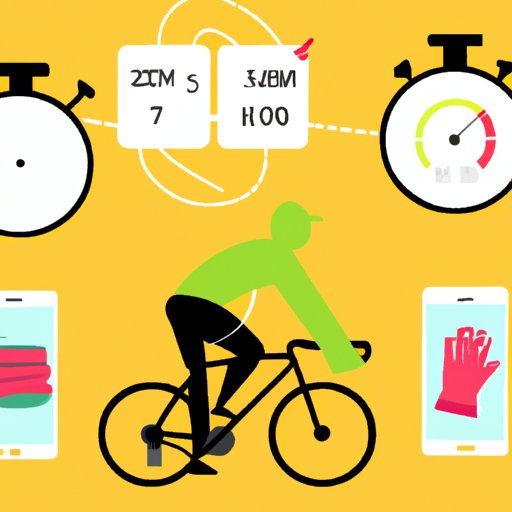Introduction
Cycling is a great way to get in shape and lose weight. It can be done indoors or outdoors, depending on your preference and the weather. Cycling is a low-impact form of exercise, so it’s easy on your joints and muscles. With the right plan and some determination, you can reach your weight loss goals by cycling.
Overview of the Problem
If you’re looking to lose weight, cycling can be a great option. It’s low impact, so it won’t put as much strain on your body as running or other forms of cardio. Plus, it’s relatively easy to do, so you don’t have to worry about complicated movements or learning new skills. But if you want to lose weight with cycling, you need to be sure to do it properly.

Benefits of Cycling for Weight Loss
Cycling has a number of benefits when it comes to weight loss. First, it’s a great way to burn calories. Depending on your speed and intensity, you can burn up to 600 calories per hour! That’s a lot of fat burning potential. In addition, cycling can help build muscle, which will boost your metabolism and help you burn more calories even when you’re not riding. Finally, cycling can help reduce stress and improve your mood, both of which can help you stick with your weight loss plan.
Tips for Creating an Effective Cycling Workout Plan for Weight Loss
If you’re serious about losing weight with cycling, then you need to create an effective workout plan. Here are some tips to help you do that:
Setting Goals
The first step in creating an effective cycling workout plan is to set specific goals. Decide how many days per week you want to ride and how long each ride should be. Then, decide what type of rides you want to do (interval training, hill rides, etc.). This will help keep you motivated and on track.
Incorporating Interval Training
Interval training is an important part of any cycling workout plan. Interval training involves alternating between periods of high-intensity and low-intensity exercise. For example, you might cycle hard for two minutes, then slow down for four minutes. This helps keep your heart rate up and helps you burn more calories.
Varying Intensity Levels
It’s also important to vary the intensity levels of your workouts. Don’t just stick with one pace; mix it up. Try doing some sprints or hill climbs to challenge yourself and keep your body guessing. This will help you maximize your calorie burn and keep your workouts interesting.

How to Track Your Progress and Stay Motivated While Cycling for Weight Loss
Once you’ve created a workout plan, you need to track your progress and stay motivated. Here are some tips to help you do that:
Tracking Your Progress
It’s important to track your progress so you can see how far you’ve come. Invest in a heart rate monitor or GPS watch to track your time, distance, and calories burned. This will help you stay motivated and on track.
Setting Realistic Goals
Set realistic goals for yourself. Don’t try to do too much too soon. Start small and work your way up. If you push yourself too hard, you’ll end up getting discouraged and giving up.
Staying Motivated
Find ways to stay motivated while cycling. Listen to music, join a cycling group, or compete in a race or charity ride. Having something to look forward to can help you stay focused and motivated.
Common Mistakes to Avoid When Cycling for Weight Loss
When it comes to cycling for weight loss, there are some common mistakes you should avoid. Here are a few:
Not Hydrating Properly
It’s important to stay hydrated when cycling. Make sure you’re drinking enough water before, during, and after your rides. Dehydration can lead to fatigue and cramps, which can make it harder to stick with your cycling routine.
Over-Training
It’s also important to avoid over-training. Too much exercise can lead to burnout and injury. Make sure you’re taking rest days and listening to your body. If you’re feeling tired or sore, take a break.
Not Taking Rest Days
Rest days are just as important as workout days. Take at least one day off per week to allow your body to recover. This will help you stay injury-free and maximize your results.

Cycling as a Part of a Comprehensive Weight Loss Program
Cycling can be a great part of a comprehensive weight loss program. To get the best results, combine cycling with a healthy diet and some strength training. Eating a balanced diet will help you maintain a healthy weight and give you energy for your workouts. Strength training will help you build lean muscle and boost your metabolism. And of course, cycling will help you burn calories and stay active.
Conclusion
Cycling can be a great way to lose weight. With the right plan and some determination, you can reach your weight loss goals. Just remember to set realistic goals, track your progress, and stay motivated. Also, make sure to combine cycling with a healthy diet and some strength training for the best results. Good luck!
Summary
Cycling is an effective way to lose weight, but it needs to be done properly. Create an effective workout plan and track your progress to get the best results. Don’t forget to drink plenty of water, take rest days, and combine cycling with a healthy diet and some strength training. With the right plan and some determination, you can reach your weight loss goals.
Final Thoughts
Cycling can be a great way to lose weight and get in shape. Just remember to create an effective workout plan, track your progress, and stay motivated. And don’t forget to combine cycling with a healthy diet and some strength training for the best results.


